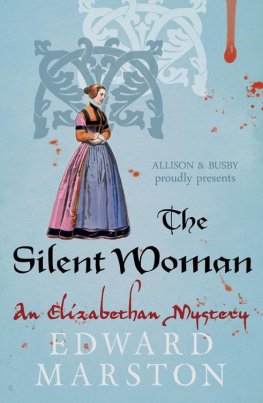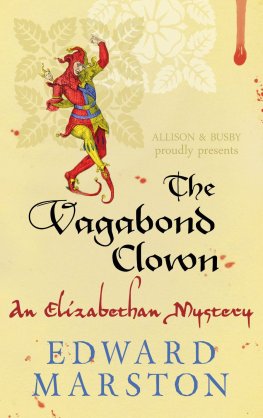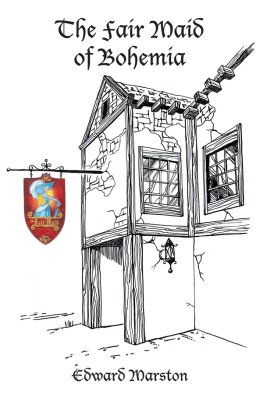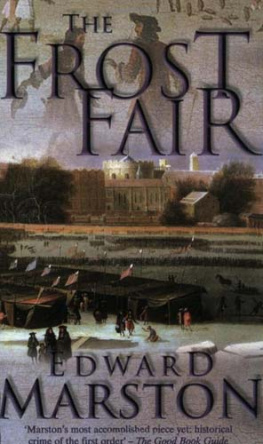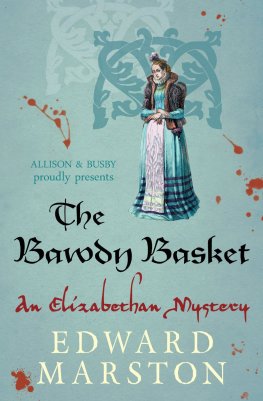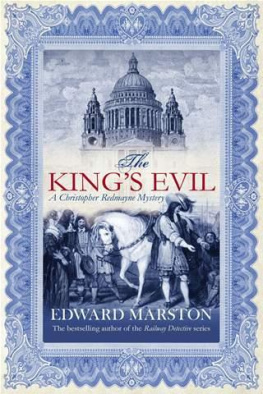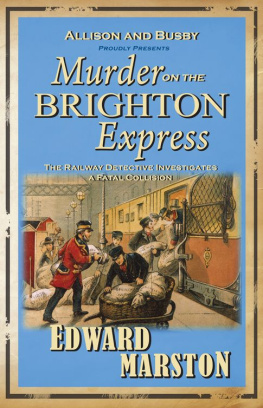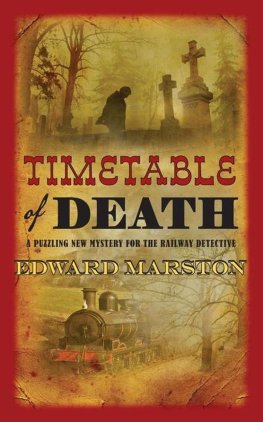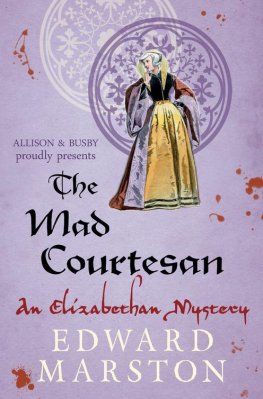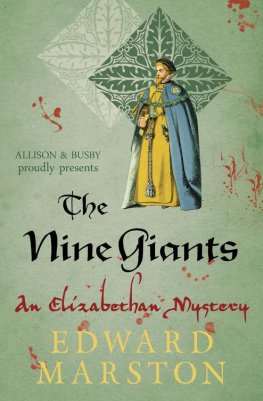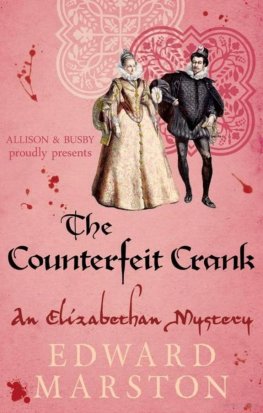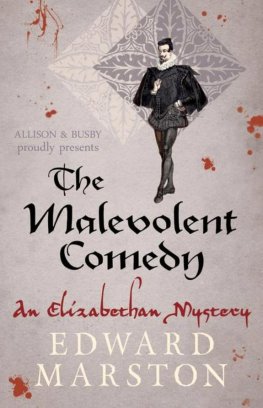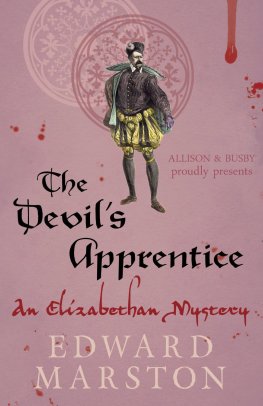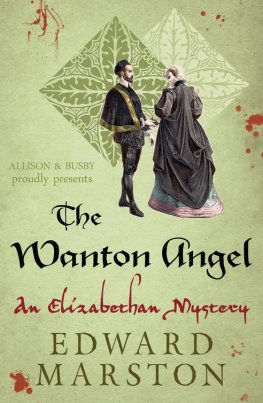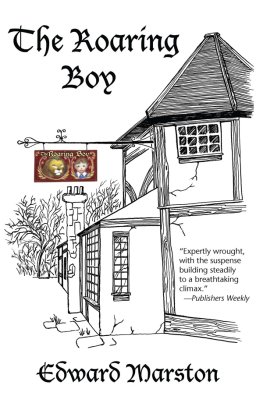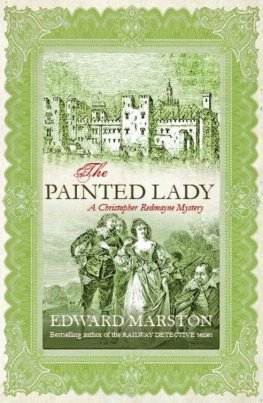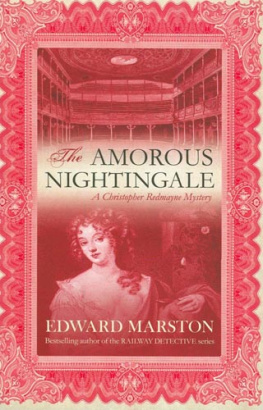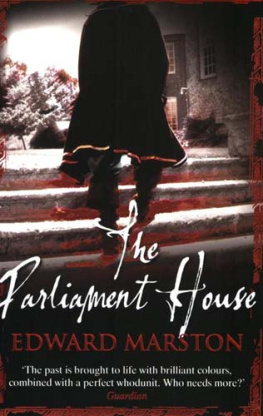Edward Marston - The Silent Woman
Here you can read online Edward Marston - The Silent Woman full text of the book (entire story) in english for free. Download pdf and epub, get meaning, cover and reviews about this ebook. genre: Detective and thriller. Description of the work, (preface) as well as reviews are available. Best literature library LitArk.com created for fans of good reading and offers a wide selection of genres:
Romance novel
Science fiction
Adventure
Detective
Science
History
Home and family
Prose
Art
Politics
Computer
Non-fiction
Religion
Business
Children
Humor
Choose a favorite category and find really read worthwhile books. Enjoy immersion in the world of imagination, feel the emotions of the characters or learn something new for yourself, make an fascinating discovery.
- Book:The Silent Woman
- Author:
- Genre:
- Rating:5 / 5
- Favourites:Add to favourites
- Your mark:
- 100
- 1
- 2
- 3
- 4
- 5
The Silent Woman: summary, description and annotation
We offer to read an annotation, description, summary or preface (depends on what the author of the book "The Silent Woman" wrote himself). If you haven't found the necessary information about the book — write in the comments, we will try to find it.
The Silent Woman — read online for free the complete book (whole text) full work
Below is the text of the book, divided by pages. System saving the place of the last page read, allows you to conveniently read the book "The Silent Woman" online for free, without having to search again every time where you left off. Put a bookmark, and you can go to the page where you finished reading at any time.
Font size:
Interval:
Bookmark:
Edward Marston
The Silent Woman
How often have forced contracts been made to add land to land, not love to love? And to unite house to house, not hearts to hearts? Which hath been the occasion that men have turned monsters and women devils.
THOMAS HEYWOOD: A Curtaine LectureChapter One
A wind from heaven blew upon the fire of hell and spread damnation. The spectators who were packed into the yard of the Queens Head in Gracechurch Street thought at first that it was all part of the entertainment, some new and carefully rehearsed piece of action that had been woven into the fabric of the play for their benefit. It made them laugh even more. But they soon learnt that their mirth was completely misplaced and that they were caught up in a real crisis. Riotous comedy became stark tragedy. Catastrophe threatened.
What they were watching on that sunlit afternoon was The Devils Ride Through London, a staple drama from the repertoire of Westfields Men, one of the leading theatrical troupes in the capital. The plot was simple. Deciding to visit the city in order to terrify its inhabitants, the Devil as played with manic hilarity by Barnaby Gill, the companys resident clown found it impossible to make any impact because the pain, misery and wickedness he encountered on earth was far worse than anything he could offer in hell. The man who most embodied the evils of London, and around whom the play revolved with giddy speed, was Sir Henry Whoremonger. Traitor, coward, liar, thief, drunkard, gamester and lecher supreme, he kept the seven deadly sins spinning through the air with the skill of a master juggler. The role of Sir Henry drew yet another masterly performance from Lawrence Firethorn, the actor-manager and unrivalled star of Westfields Men, enabling him to amuse, shock, instruct and excite the audience by turns and whip them into an uproar with the crack of a line whenever he chose. Firethorn made villainy attractive and won the hearts and minds of all who watched. It was no wonder the Prince of Darkness concluded that Sir Henry Whoremonger was by far the greater devil.
Instead of frightening the citizens with dire warnings of what lay ahead, His Satanic Majesty was so shaken by the horrors of everyday life in London that he fled back to the nether regions as fast as his cloven feet would take him. Crouched over a brazier at the rear of the stage, he warmed his hands at the flickering coals and mused on the folly of his visitation.
The sulphurous stench of my own estate
Is perfume compared to Billingsgate.
My vilest tortures are petty sores
On putrefying, pox-ridden Eastcheap whores.
Our howls of anguish are happy sighs
When heard alongside Bedlams cries.
My foulest poison can never compete
With Marwoods ale in Gracechurch Street.
In the stews of Southwark they have worse fare
Than those who toil here in the Devils lair.
The first gust of wind brought the brazier to life and flames leapt up to lick at Barnaby Gills red-gloved hands. He pretended that he had deliberately stoked up the fire and he danced around it with comic despair.
Mortals, behold! You have all witnessed how
London is the truer Purgatory now.
Henceforth Ill lease out cold and timid hell
And dwell instead in fiery Clerkenwell.
Clothed from head to foot in a blood-red costume, the Devil flung back his flowing red cloak and adopted a pose of utter defeat. He did not hold it for long. As soon as his garment passed over the top of the brazier, a phantom wind blew so hard on its coals that it became a roaring inferno. The cloak was ignited, the Devil became a being of dazzling light and Barnaby Gill charged around the stage in wild agitation as he tried to rid himself of his burning apparel. His plight earned him no sympathy from the audience. They rocked with laughter and cheered with delight. This act of spontaneous combustion was the funniest thing they had ever seen, and they marvelled at Gills expertise. When the hapless clown blundered against the backcloth that hung from the gallery above the stage, however, all humour was instantly extinguished. The painted flames of hell were now horrendously real. The playgoers were not, in fact, seeing a remarkable feat by an accomplished comedian. A human being was, literally, on fire in front of them.
Panic descended. Men yelled, women screamed, horses neighed and kicked in their stables. All ceremony was abandoned. The hundreds of patrons jammed shoulder to shoulder in the yard itself fought madly to get to the nearest exit. Gallants and their ladies, who had paid an extra penny or two to sit in the galleries, knocked over their benches in their desperation as yellow sparks flew up at them and offered to turn their fine clothes into balls of fire. Nicholas Bracewell was the first person to burst onto the stage. Having controlled the performance from behind the scenes, the book holder now thrust himself purposefully into the action, darting out with a wooden bucket of water and hurling it over Barnaby Gills cloak before tearing the garment from him. Nicholas burnt his fingers slightly, but he undoubtedly saved his colleagues life. Still shrieking with fear, the Devil went sprinting off into the tiring-house to make his escape. Nicholas took stock of the situation, but it was beyond even his resourcefulness. The fire had gained a purchase on the backcloth and was eating its way hungrily upwards. A wall of flame confronted the hysterical onlookers.
Pandemonium now set in. The whole inn seemed to be ablaze. Wherever people ran, they were engulfed by smoke. The acrid smell filled their noses, the crackling flames attacked their ears, the fear of a hideous death crazed their minds. They were as frantic and helpless as the animals now bucking wildly in their stalls. Preferring to live in poverty than to die rich, pickpockets in the crowd took no advantage of the chaos and used both hands to claw a passage out of the yard. The Devils Ride Through London had turned the Queens Head into a veritable hell. Survival was all that mattered. Self-interest was deafening.
Nicholas Bracewell wasted no time. He knew that the real danger lay in the overhanging thatch on the topmost gallery. Dried by the sun and crumbling with age, it would go up like tinder, if set alight, and the entire establishment would be destroyed along with several of the adjoining buildings. It was vital to contain the fire as quickly as possible and to stop its upward climb. Nicholas pulled out his dagger and raced to the rear of the stage to hack at the rope that held the backcloth aloft. Cut free from its moorings, it was blown up into the air for a second before coming down like a huge hand of doom to clutch at the fleeing multitude with scorching fingers. This was no longer a merry romp. It was the Last Judgement.
The book holder grabbed another bucket of water from the tiring-house and rushed back onstage to douse the burning backcloth. He then jumped bravely into the flames and tried to stamp them out. Others now followed his example and brought fresh supplies of water. Thomas Skillen, the ancient stagekeeper, emptied his bucket over the brazier then yelled at his assistants to throw their water over the backcloth. While these lowly members of the company hurried off to refill their buckets from the waiting barrels, the actors themselves came out to fight the common enemy. Fire was a great social leveller. Position and dignity were forgotten in the swirling calamity. Westfields Men were not just helping to save their patrons. They wanted to preserve their theatre and their livelihood.
Lawrence Firethorn came hurtling back onstage with a sodden blanket in his hands. Deprived of his curtain call and of what he saw as the due reward for his towering performance as Sir Henry Whoremonger, he yelled with fury and beat vengefully at the flames. Edmund Hoode was anguished by the sudden termination of one of his best plays, and he came out with a bucket of water dangling from each hand. Barnaby Gill had recovered his composure enough to reappear with a fire shovel and smack away at the smouldering timbers. The burly figure of Owen Elias emerged from the mouth of hell that was the tiring-house and heaved out one of the large water barrels. Nicholas leapt across to help him, and the two of them strained to tip it over. The flaming backcloth became a hissing river of smoke that all but obliterated the inn yard. Commotion now reached fever pitch.
Font size:
Interval:
Bookmark:
Similar books «The Silent Woman»
Look at similar books to The Silent Woman. We have selected literature similar in name and meaning in the hope of providing readers with more options to find new, interesting, not yet read works.
Discussion, reviews of the book The Silent Woman and just readers' own opinions. Leave your comments, write what you think about the work, its meaning or the main characters. Specify what exactly you liked and what you didn't like, and why you think so.

